8 key takeaways from hearing about Russian disinformation
The Foreign Affairs Committee held a hearing yesterday on Russian attempts to undermine democratic institutions and splinter the NATO alliance, with four expert witnesses testifying about Russia’s attempts to spread disinformation.
Below are eight key takeaways from the hearing:
- Last year, Russia sought to influence the U.S. election.
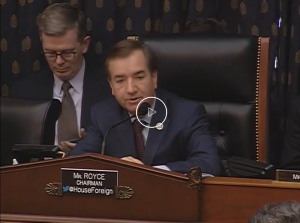
Chairman Royce: “In January, the U.S. Intelligence Community produced a report which found that ‘Russian President Vladimir Putin ordered an influence campaign in 2016 aimed at the US presidential election.’ Thankfully there is no evidence to suggest Russia interfered in our voting and tallying process. But Members of Congress rightfully have many more questions surrounding Russian meddling. So it is appropriate that the intelligence committees, on a bipartisan basis, are working to get to the bottom of this. We need answers. And we need to make sure it doesn’t happen again. Indeed, the Intelligence Community reports warn that ‘Moscow will apply lessons learned…to future influence efforts worldwide, including against U.S. allies and their election processes.’” - This year, Europe will be the main battlefield in Russia’s disinformation campaign.
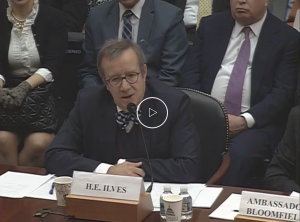
President Ilves: “What we see now, and I would argue this will be the main battlefield for the next year, is Europe, where…there are a number of key elections coming up. Not only key elections, but among major countries. The large countries, first and foremost Germany and France, will have elections. There are strong odds there will be an Italian snap election this year. That’s three out of the four remaining big countries in Europe, now that the U.K. has left. So this is a big year. And then there are the crucial elections in the Netherlands…And in all cases we have seen significant meddling. The Dutch are so afraid they have decided to go back to paper balloting because they’re afraid of what might happen.” - Russia’s goal is to split the West apart.
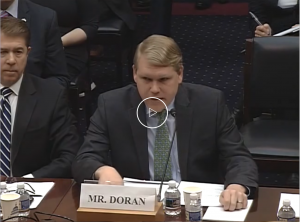
Mr. Doran: “The Russian government is sharpening its use of state-sponsored propaganda against Western democracies. This puts democratic states and NATO at risk. This committee should have no doubt: Russia is a rival to the United States. The strategic aims of the Russian government are fundamentally incompatible with American interests in Europe…Russia wants to establish a sphere of privileged influence in Europe. But to do so, they must weaken America’s links to our allies, divide NATO, and – if necessary – use force. Russia’s problem is that, against a united Atlantic alliance, Russia is relatively weak. Against individual states in Europe, Russia is comparatively strong. Russian leaders know this. It is why they must fracture allied security, stoke public distrust against democratic institutions, and discredit the alliance structures that defend Europe. If we are divided and distracted, Russia can challenge the U.S.-led security order. This is Russia’s aim. Propaganda is a means.” - The disinformation techniques we’re seeing from Russia aren’t new.
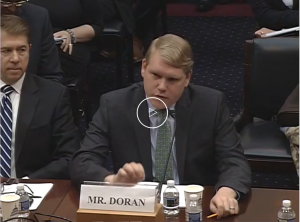
Mr. Doran: “One of the things that we have seen is that Russia has field-tested many of its propaganda techniques that it has utilized in Western democracies now, it has field-tested these concepts and techniques in Central Europe, in frontline states. What we’re seeing is not new. One of the points I would stress for the committee is the urgency and the speed at which these techniques are evolving. They’re going from laboratory to field test to refinement rapidly. Our responses are slow. Our messaging is clunky. And we’re combating a highly effective, well-funded effort that does not care about facts.” - But Putin is vulnerable. We can fight back.
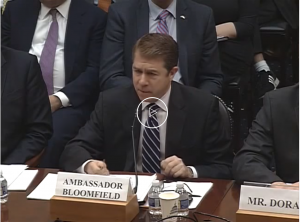
Ambassador Bloomfield: “[Russia is] very brittle. …Look at the information age: Information is omnipresent. But they’re trying to control the media. Russian television never told the Russian people that they had boots in Ukraine; they hid the fact. So they are extremely vulnerable to a reverse information campaign from the West.” - To do that, we must strengthen our response to Russian disinformation.
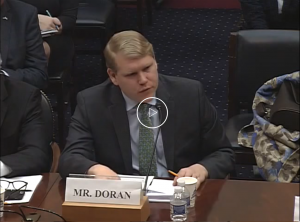
Mr. Doran: “We’ve got to move quickly to have a better handle on how Russian propaganda works and, specifically, the impact it’s having. You mentioned Radio Free Europe/Radio Liberty; that is one of several avenues we should take. I would stress to this committee an all-of-the-above approach when it comes to counter strategies against Russian propaganda. This means media education. It means broadcasts. It means online. It means leveraging humor and satire; this is something that Vladimir Putin and the Russian leadership are very vulnerable to.” - Chairman Royce and the committee have long worked to make U.S. international broadcasting more effective in the fight to counter Russian disinformation.
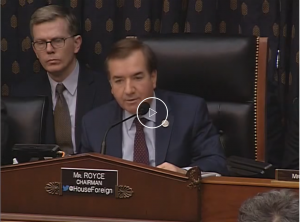
Chairman Royce: “In December, the President signed legislation authored by myself and Mr. Engel – and pushed by this Committee – to empower a CEO to run all U.S. international broadcasting. The CEO should use its new authority to prioritize this threat and the Committee should look at other steps we can take to intensify U.S. international broadcasting. And more should be done to hold those hacking accountable. And why not go on the offense to release information exposing corruption at the Kremlin?” - We can win by sticking with our allies and reinforcing our democratic values.
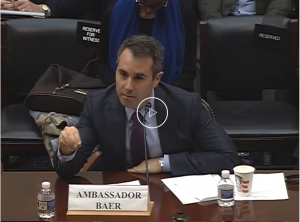
Ambassador Baer: “Vladimir Putin’s greatest fear is a democratic, successful, prosperous Ukraine. That is why he’s invading Ukraine and trying to undermine the Ukrainian people’s choice to live in a European-style democracy. He is threatened by democracy’s success. And therefore, every time that we make democracy succeed, we are countering Vladimir Putin’s aims and objectives.”